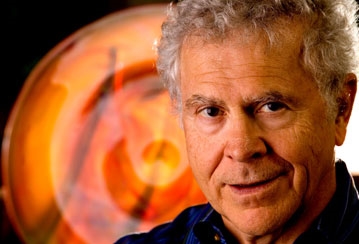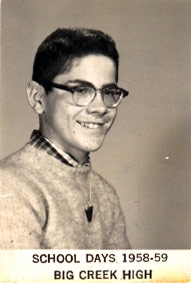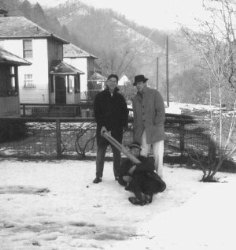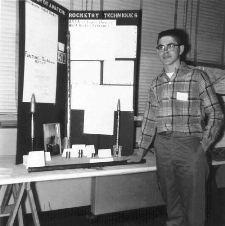 |
| Homer Hickam Jr. today (http://www.homerhickam.com/ ()) |
Winston Churchill
once said: "Success consists of going from failure to failure without loss
of enthusiasm" (Winston Churchill). These words capture the true essence
of Homer Hickam Jr. and his undying enthusiasm to grab his dreams. Homer Hickam
Jr. was born on February 19, 1943, in a small coal mining town called Coalwood,
in West Virginia. He held a sunny disposition, and his mother and everyone who
knew him called him Sonny. His parents, Homer Hadley Hickam Sr. and Elsie
Lavender Hickam, often disagreed over Hickam's future because he lacked talent
in subjects his father considered important. Hickam's father rarely took notice
of his second son, and believed the only future available remained in the
coalmines most men eventually entered for jobs. Nevertheless, Hickam buried
this thought behind him and surged forward in pursuing his personal dreams in
rocket engineering. On the night of October 5, 1957, Hickam heard of Sputnik,
the first rocket to enter space, and eventually watched it travel across the
sky. The night he observed Sputnik, Hickam made a resolution: he would
build a rocket. Upon announcing his newfound interest, Hickam's family supplied
little to no support or belief he could accomplish such a feat. Yet he strode
forward, regardless of the lack of approval others gave and the number of
failures accumulated from his experiments. Hickam's curiosity and enthusiasm to
succeed brought him far, but his unwavering personality and optimism towards
accomplishing what he desired pulled him furthest. With an enthusiastic and optimistic
look towards his dream, Homer Hickam Jr. persevered and grew into an
extraordinary man from ordinary surroundings.
 |
| Homer Hickam Jr., school picture 1958-1959 (http://www.homerhickam.com/newsletters/coalwood2.shtml ()) |
Because of his unwillingness to accept failure and his pure determination,
Hickam gradually edged toward his dream during his pursuit of success. When
starting his experiments to gather data, Hickam felt embarrassed that his
experiments might end in failure. With some support from a fellow Rocket Boy,
Hickam became determined to succeed. Hickam recalled his colleague's words and
his own thoughts about the launch: "What he was saying was that we had to
start somewhere, either succeed or fail, and then build what we knew as we went
along. It seemed to me, considering all the rockets that I read about blowing
up down at Cape Canaveral, that was the way Wernher von Braun and the other
rocket scientists did their work too" (Hickam 83-84). Hickam faced two futures.
He could have deserted his dream and accepted his future in a small coal mining
town, or he could take the first step in accomplishing his dream. Anxious about
failing, Hickam considered his options and knew he just needed to start. He
chose the more unpredictable future that allowed him to move forward in his
hopes to escape Coalwood. A key step to moving forward in his rocket launches
was enrolling in a Calculus class. After asking his principal why his school
did not provide one, the principal stated: "'Because'...'this is Big Creek
High School. Maybe if this was Welch High, the county superintendent would
approve such a class, but not here. We're a football and a coal miner's school,
and that's all we've ever been" (Hickam 257). No one expected much from a child
of a coal mining family, but Hickam wanted to prove otherwise. Hickam fought
greatly with the school and brought a small Calculus class into Big Creek High
School's curriculum he was unfortunately unable to join. Not to be hindered by any
obstacles, Hickam taught himself calculus. Despite his struggles in
mathematics, he made his own progress by taking the initiative to do what he
wanted. From launching and building rockets, to teaching himself the necessary
curriculum, Hickam's fierce determination kept him thirsting for success.
 |
| Hickam, on left, with other Rocket Boys and rocket (http://www.homerhickam.com/newsletters/coalwood2.shtml ()) |
Although others believed Hickam would fail before beginning, his own dream of
creating and launching rockets kept him moving forward and he planted all of
his optimism in that dream, hoping he would eventually reach it. Hickam was not
disheartened by the start of his pursuit, or by the numerous failed attempts acquired
from moving forward. When prompted about the beginning of the Rocket Boys in an
interview, Hickam replied: "Starting with
no knowledge of how to build a rocket, we began to try to learn all we
could. At first, we failed everything we tried. Gradually, we began
to learn and soon we were building rockets that were going over 1,000 feet high"
(Imagiverse). Hickam began amateur rocket building with the sporadic thought
that one day; he would work alongside his hero, Wernher von Braun, the man who
helped launch Sputnik. Hickam's first step catalyzed his optimism to grab the
success awaiting him. He hoped for a future outside of Coalwood; he wanted a
freedom brought by rocket engineering. Although Hickam knew nothing about
rockets, his optimism in reaching success propelled him forward and
strengthened his effort. Hickam spent many of his days remaking plans and
restudying his failures. He turned these tedious tasks into a hope that he
would create a rocket capable of flight. After small test runs, Hickam created
his first true rocket and explained that: "I named it Auk I, after
the great auk, an extinct bird that couldn't fly... I had a purpose in the
name. I wanted to make it clear to the other boys that we were adding to our
body of knowledge even if all this rocket did was spew on its launchpad"
(Hickam 104). Hickam realized how low the chances of success were and named all
the rockets flown during this time after the Auk; a bird that cannot fly. Optimism
was Hickam's mental rocket; it built him a sensation of never failing as long
as he moved forward. It kept him anchored to his path towards success and
allowed him to continuously rise from defeat. He shielded the others from the
discouraging thought of failure and urged them to continue. His optimistic
views provided a fountain of youth that kept his dreams fresh and new each day
that passed. Hickam's optimism helped drive him forward as he strived for a
success far out of his reach.
 |
| http://www.homerhickam.com/newsletters/coalwood2.shtml () |
Hickam
continuously persevered for accomplishment, attempting to satisfy an urge in
him to achieve the success he never knew was possible before. Looked down on by
the majority of the Coalwood people, Hickam and his rocket club bore past their
troubles to succeed in their goal. Describing the scorn they met, it was
written: "The rocket club suffered the jeers of the townspeople and the
taunting of Hickam's older brother Jim and his gang of friends" (Gale
Biography in Context). Although Hickam faced the disapproval of his entire
town, he persevered to surpass his own expectations and continue furthering his
knowledge in rocket engineering. His persistence in his attempts and efforts to
gain success forced him to suffer through many embarrassing and disappointing
obstacles throughout his journey. These disappointments were Hickam's footholds
to climb to the top of everything he worked hard to become. Despite his
unsupportive circumstances, Hickam lead his rocket club to success when one of
their rockets flew past a mile. It was one of the most exciting moments for
Hickam, as it became the turning point in other peoples' support for the Rocket
Boys. When recapping the moment where his perseverance paid off, Hickam states:
"'Five thousand seven hundred and seventy-six feet!'...We had done it!
We had broken the mile barrier!" (Hickam 326). Burdened by the
numerous difficulties of his personal life and his rockets, Hickam kept a
strong-willed mind to help push him further towards his goal. Hickam launched
his rockets with his perseverance and they flew to heights others aspired to
reach. By breaking the mile barrier, Hickam proved to others and himself his
interest in rockets was not a mere child's game everyone could attempt. Hickam
accomplished his success with his undying perseverance in rocket engineering.
Hickam's perseverance shone in his ceaseless efforts to launch rockets that
often miserably failed but managed to surpass everyone's beliefs in the end.
Homer Hickam Jr. displays true heroism by refusing to let impediments hinder his path towards success. Hickam fought for what he desired. Refusing to be brought down by others, Hickam looked at the world with a bright curiosity and sunny optimism. He stood up for what he loved and took the chances people feared to take. Hickam stamped his own mark on the world, rising again and again after every failure. While all the influences and people surrounding him meandered through the coal, his heart and soul wandered the skies and the infinite mysteries beyond. Hickam grew up in a town where predestined fates drove people to the coalmines. Although this fate influenced them, Hickam craved something better. He molded his own future, not something predesigned for him. He took the initiative everyone else ignored and believed impossible. He took the first step. One of the Rocket Boys who worked with Hickam once stated before a launch: "A rocket won't fly unless somebody lights the fuse!" (Imagiverse). Hickam took these words to heart and mentioned this quote in high regards. "Although he (the Rocket Boy) was talking about a rocket, it's good advice for accomplishing anything. You've got to light that fuse and get on with it!" (Imagiverse). These words unified the eternal message Hickam set as a normal man who created something legendary. I regard Homer Hickam Jr. as my personal hero because of his determined outlook on life. He began an ordinary, pedestrian life, but his rocket engineering brought him to a new world. Heroes are people who have accomplished great things in difficult or troubled situations. Hickam is a hero among the common man; he is one of the many everyday heroes that people neglect to mention. A hero: someone to be admired, someone to provide help, someone to be a role model. People seek heroes with their individual criteria set in mind. I see Hickam as a true hero for making a bold statement, and immortalizing the idea that anything can be accomplished with enough motivation. Winston Churchill once said: "Success consists of going from failure to failure without loss of enthusiasm" (Winston Churchill). Hickam resolved to have enthusiasm regardless of the obstacles to come. In an optimistic environment with Hickam's determination and perseverance to make it bloom, his success blossomed into a beautiful treasure. Hickam's efforts brought the beauty of success to the black dust of the coal mines that gathered everywhere in Coalwood, establishing a message to the ordinary man that anything was possible. His endless enthusiasm to succeed no matter what the circumstances were allowed Hickam not only to nurture his success, but also pass the message to others, so that they can begin planting their own beautiful successes.
Works Cited
Hickam, Homer H. October Sky: A Memoir. New York: Island, 1999. Print.
"Homer Hadley Hickam, Jr." Gale Biography in Context. Detroit: Gale, 1999. Gale Biography In Context. Web. 21 Mar. 2012.
"Homer Hickam, Jr." Imagiverse. 10 Sept. 2003. Web. 22 Mar. 2012.
"Winston Churchill." Contemporary Heroes and Heroines. Vol. 2. Gale, 1992. Gale Biography In Context. Web. 12 Apr. 2012.
Page created on 4/20/2012 12:00:00 AM
Last edited 4/20/2012 12:00:00 AM
